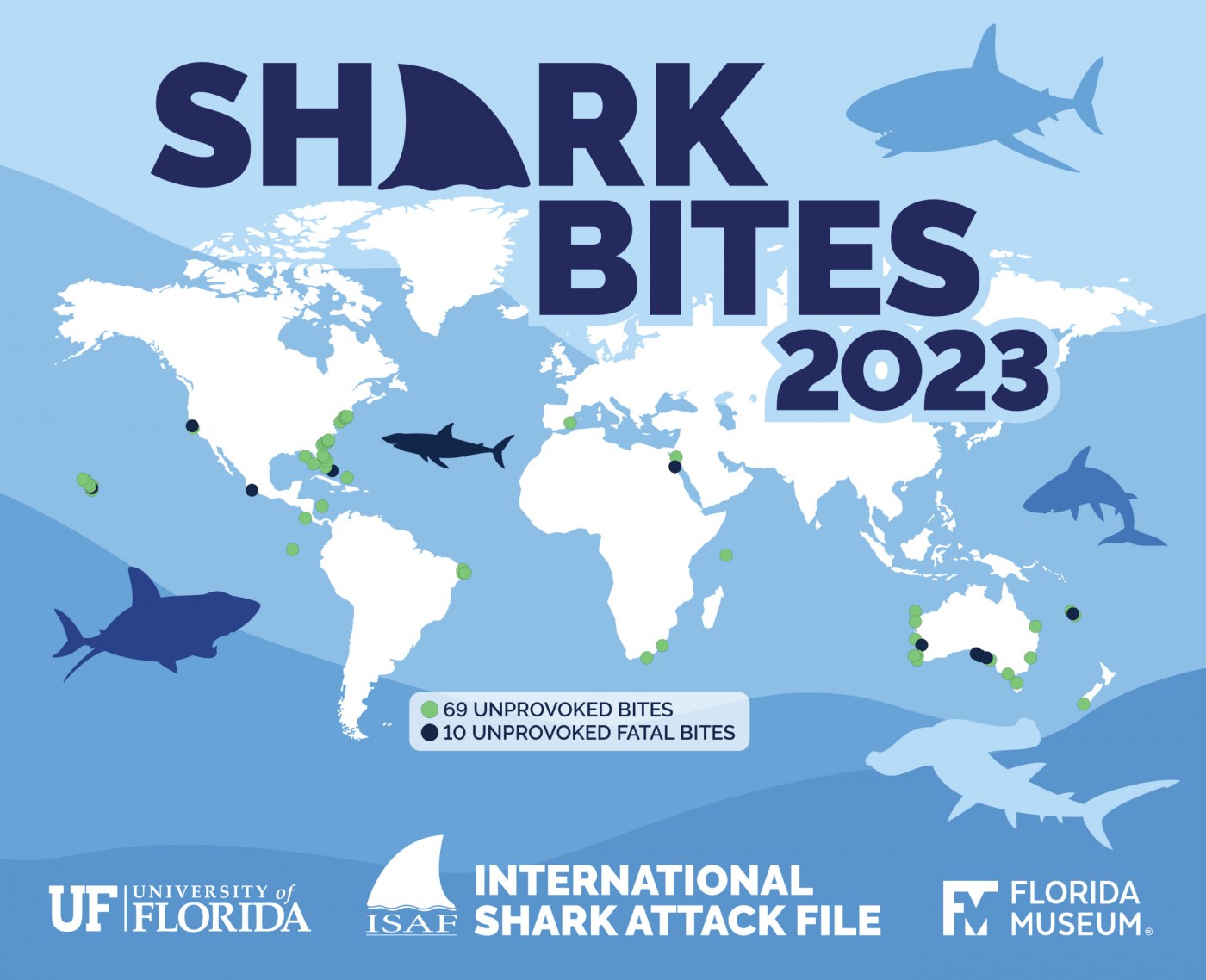
Deadly shark bites have jumped: Where did the most shark bites happen in the US?
Deadly shark bites doubled around the world and unprovoked shark attacks jumped last year, according to shark researchers who called the rise in fatalities “a bit unnerving.”
Overall last year, there were 69 reported shark bites on humans, according to a new report from the University of Florida’s International Shark Attack File, a scientific database of global shark attacks. This was higher than the most recent 5-year average of 63 shark bites.
Ten of the shark bites were fatal — up from five fatalities in 2022 — with four of the 10 deadly bites occurring in Australia. Two of the 10 fatalities were in the U.S.
“This is within the range of the normal number of bites, though the fatalities are a bit unnerving this year,” said Gavin Naylor, director of the Florida Museum of Natural History’s shark research program.
The U.S. had 36 shark bites, accounting for 52% of incidents worldwide. Of these, two — one in California and another in Hawaii — were fatal.
As in previous years, Florida had more shark bites than any other state, with 16 attacks. In the Northeast, New York had four reported shark bites and New Jersey had one.
Meanwhile along Cape Cod, the great white shark hotspot did not have a reported shark bite for yet another year. But Cape surfers did report a close call with 10-foot great white shark.
Seven of last year’s shark bites around the globe came from great white sharks. Three of those were fatal.
“If a white shark is going after a seal and the seal knows it, the white shark hasn’t got a chance,” Naylor said. “Seals are really agile, so the only ones that get caught are the ones that are goofing off and flopping around on the surface minding their own business. And that’s kind of what a surfer looks like.”
Surfers experienced 42% of shark bites worldwide, with swimmers and waders a close second at 39%.
Related Articles
The first-ever newborn great white shark sighting? ‘One of the holy grails of shark science’
How massive was the Megalodon shark? The Meg was not like a gigantic great white shark, study finds
Massachusetts gets more than $4 million for new lobster fishing gear to protect right whales, other measures
Top 10 local Boston Herald stories of 2023, as chosen by readers [+links]
Cape Cod shark researchers have tagged more than 300 great whites, sharks still detected off Massachusetts in mid-December
The vast majority of unprovoked attacks are test bites, which occur when a shark misidentifies a human as their preferred prey. When this happens, the shark will typically swim away after a single bite. Some species like white sharks and tiger sharks, however, are large enough that even a single bite can be fatal.
Despite the increase, the number of bites and fatalities that occurred last year are within the average for the past decade. Each year, there are consistently fewer than 100 unprovoked bites, making it more likely for someone to win the lottery than to be attacked by a shark.
When there are more attacks, it often means that more people are spending time in the water — not that sharks have become more dangerous. Increased human activity in sharks’ habitats naturally leads to an increase in the number of animal encounters.
Also, water quality around New York has increased over the last two decades, and experts attribute the greater number of marine mammals observed off the coast to bigger fish populations. More fish often means more sharks as well.
This contributed to several bites over a few weeks last summer, including the first known shark attack in New York City in more than half a century.
“It causes a lot of fear, but the reality is you’re putting a lot of people in the water on a hot day with bait fish in the water,” Naylor said.
While the odds of being bitten by a shark are incredibly low, ISAF provides recommendations for precautions that people can take. These include staying close to shore, not swimming at dawn or dusk, and avoiding excessive splashing.
Shark warning signs are sure to return at Lighthouse Beach in Chatham. (Stuart Cahill/Boston Herald)


